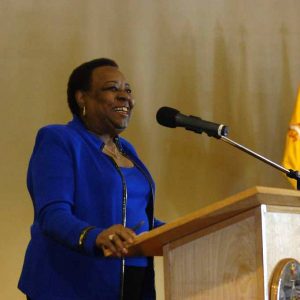calsfoundation@cals.org
Irma Lee Hunter Brown (1939–)
Irma Hunter Brown of Little Rock (Pulaski County) served in the Arkansas House of Representatives from 1981 to 1998 and in the Arkansas Senate from 2003 to 2008. She was the first African American woman elected to the Arkansas House and then became the first African American woman elected to the Arkansas Senate.
Irma Lee Hunter was born on January 5, 1939, in Tampa, Florida, to Dovie Estoria White Hunter and Joseph Hartwell Hunter. She grew up in Forsyth, Georgia, where she attended segregated public schools and graduated from Hubbard High School. She moved to North Little Rock (Pulaski County) to attend Shorter College, received her associate’s degree in 1958, and then transferred to Arkansas AM&N (now the University of Arkansas at Pine Bluff), where she was a member of Alpha Kappa Alpha Sorority and graduated magna cum laude in 1960 with a double major in history and government and a minor in education. She taught in the Memphis public school system from 1961 to 1964, and then took graduate classes at Memphis State University. She married Roosevelt Brown and they moved to Washington DC, where he attended the Howard University College of Dentistry, while Irma took classes at the District of Columbia Teachers College (now University of the District of Columbia). She taught in the DC public schools from 1965 to 1969.
The family moved back to Arkansas in 1969, and by 1972 Brown was engaged in community service work in nutrition education with the neighborhood centers. As director of Differential Day Care Placements in 1974–1975, she worked with Dr. Sara Murphy at the Arkansas Department of Education in acquiring grants and matching a center with families in need of daycare services. She also entered the political arena in 1972, working to elect Dr. Jerry Jewell, the first African American to serve in the Arkansas Senate since Reconstruction. She worked on Governor Dale Bumpers’s 1974 U.S. Senate campaign. In 1975, she was a participating fellow with the Arkansas Institute of Politics.
Brown first ran for the Arkansas House of Representatives in 1976, promising “Effective, Aggressive, and Innovative Leadership” and challenging incumbent Representative Robert Johnston in the Democratic primary but losing in a run-off. She remained involved in state issues as the appointed chair of the new Arkansas Human Resources Commission to promote and protect civil rights. Then she ran again for the House in 1980, winning the Democratic primary runoff and then the general election against a Republican candidate and independent candidate. Representative Brown began her service in the House in 1981 as the first Black woman to serve in the Arkansas House of Representatives. She was a founder of the Arkansas Legislative Black Caucus and served as its first chair.
One of the first bills Brown sponsored and passed was one that increased diversity on state boards, commissions, committees, and task forces. She worked on education reform when Arkansas first lady Hillary Rodham Clinton was appointed by Governor Bill Clinton to head the task force on the subject. Brown stated that the redistricting in 1970 opened more opportunities for minorities and women to be elected, and said that “the more women who were elected, the more the issues concerning women were addressed. And as a result of that, we found that the interests of those elected were certainly articulated in the kinds of policies set forth and became laws in the state of Arkansas.” Brown entered the 1993 speaker’s race but withdrew on the day of the election; Bobby Hogue won the race. In 1995, Speaker Hogue appointed Brown as a delegate to the proposed constitutional convention.
Brown was active in the National Conference of State Legislators (NCSL) and the National Black Caucus of State Legislators, serving on the executive committees of both. She served as an ambassador from NCSL to Japan and did a number of study tours of Germany. She represented the American Association of University Women at the first Nairobi conference and was a presenter at the conference. She was a member of Rotary International, served on the board of directors of the Little Rock YWCA, was president of the Little Rock Parent Teachers Association Council, served on the board of the Museum of Discovery, served on the founding board of the Little Rock Central High National Historical Site, and was vice chair of Arkansas Educational Television Network Foundation.
After being term-limited out of the House in 1998, Brown was appointed president of Shorter College. In 2002, she ran for the Arkansas Senate from District 33. In the Democratic primary, Brown upset incumbent Senator John Riggs by 59–41 percent and defeated Republican Herbert Broadway by 73–27 percent in the general election.
In January 2003, she became the first Black woman to serve in the Arkansas Senate. Noting that she would be among a record number of seven woman senators, Brown said that their presence “should be very, very good in terms of balancing out the issues that face us, and bringing to bear a kind of representation of equity to all.” Having drawn a two-year term, she ran for reelection to a four-year term in 2004, again defeating Republican Herbert Broadway by 78–22 percent.
Brown chaired the City, County, and Local Affairs Committee for three sessions. For the entirety of her service in the Senate, she also served on the Judiciary Committee and Arkansas Legislative Council. She led the effort to lower the high cost of collect phone calls from prisoners, resulting in a twenty-seven-percent reduction in costs. She worked on a series of land reform bills that provided options for rehabilitating abandoned or neglected properties, and she helped qualify Arkansas to participate in U.S. Department of Housing and Urban Development’s Fair Housing Assistance Program. She said that she was proud to serve at a time when the grocery tax was cut in half and was also proud to be a part of the General Assembly’s work to pass legislation to encourage and support early childhood education.
Senator Brown co-sponsored legislation that set aside $50 million for cancer research at the University of Arkansas for Medical Sciences in Little Rock (Pulaski County), which was in her district. She also worked on the addition of a $350 homestead exemption for elderly homeowners. In her last term in the Senate (2007–2008), Brown was chair of the City, County, and Local Affairs Committee; vice chair of the Joint Budget Committee; and chair of the Arkansas Legislative Black Caucus when it hosted the annual meeting of the National Black Caucus of State Legislators in Little Rock. She received the ACLU Humanitarian of the Year award in 2007, was recognized for her work in the passage of the Clean Air Act that ended smoking in restaurants, was a recipient of the Distinguished Citizen Award from Philander Smith College, and was appointed by the National Conference of State Legislators to the American Legacy Foundation.
Brown ran for a third term in 2008. She was challenged by former Representative Joyce Elliott and defeated in the Democratic primary, 58–42 percent.
After her twenty-four years of legislative service as an advocate for human rights, Brown continued to serve the community. She became a trustee of the Union African Methodist Episcopal Church and president of the Friends of Haven of Rest Cemetery, Inc., a nonprofit for preservation of the Black historic cemetery in Little Rock. The Democratic Party of Arkansas’s Black Caucus created the annual Irma Hunter Brown Women’s Leadership Award. In 2015, Brown was recognized by a plaque on the Arkansas Civil Rights Heritage Trail project of the University of Arkansas at Little Rock Institute on Race and Ethnicity, and she was inducted into the Arkansas Black Hall of Fame in 2019.
For additional information:
Irma Hunter Brown video interview with Lindsley Armstrong Smith, June 10, 2009. “Women in the Arkansas General Assembly,” University of Arkansas Women’s Giving Circle and Diane D. Blair Center of Southern Politics & Society project. David and Barbara Pryor Center for Arkansas Oral and Visual History, University of Arkansas, Fayetteville.
Oral Interview with Irma Hunter Brown, February 22, 1985. Southern Women Legislators Collection, MUM00422, Archives and Special Collections, J.D. Williams Library, University of Mississippi.
Simpson, Stephen. “Hall of Fame Set to Induct 6 New Black Honorees.” Arkansas Democrat-Gazette, September 5, 2019.
Wickline, Michael R. “Elliott Upsets Incumbent Brown in District 33 Race.” Arkansas Democrat-Gazette, May 21, 2008, pp. 1B, 6B.
———. “Senate District 33 Challenge Heats Up.” Arkansas Democrat-Gazette, April 27, 2008, pp. 1B, 5B.
Lindsley Armstrong Smith and Stephen A. Smith
University of Arkansas, Fayetteville
 American Civil Liberties Union of Arkansas
American Civil Liberties Union of Arkansas Arkansas PBS
Arkansas PBS Divergent Prosperity and the Arc of Reform, 1968–2022
Divergent Prosperity and the Arc of Reform, 1968–2022 Politics and Government
Politics and Government Irma Brown
Irma Brown  Irma Hunter Brown
Irma Hunter Brown 



Comments
No comments on this entry yet.